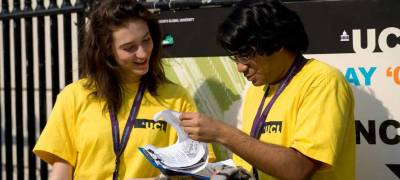Four steps towards a first-class experience.
1. Talk to people!
The staff and students in ESPS are your most important resource. Here’s why:
Academic Staff
You will have regular contact with academic staff – make use of that!
They can help you understand texts and ideas as part of your studies, advise you on picking courses for the upcoming year (particularly important in the first year when deciding on a specialisation), and could even be told about personal problems.
Speak to your class teachers if you have specific questions about their courses; speak to your personal tutor about anything, academic or otherwise, which is impacting on your studies more generally.
Administrative Staff
ESPS is an interdisciplinary, inter-departmental degree. It involves co-ordination and paperwork! You’ll need to be highly organised for life to run smoothly.
So if you’re not sure what you should be doing, and when it should be done – just ask! The administrative staff will help you keep on top of all the forms, and give you a leg up when it comes to jumping through hoops.
And they have an excellent overview of the degree and the College as a whole, making them the perfect starting point if you’re not sure where you should be headed with something.
Fellow Students
Fellow students are an invaluable source of knowledge and advice. Study groups broaden your understanding and bring new ideas.
Students in the years above will also be able to offer inside information on courses, and on the year abroad.
Second years in particular, talk to fourth years about their overseas experiences and gather advice before you go for the default ‘capital city’ option. There is also the European Society, which is a great way to put the degree into a wider context.
2. Have a goal!
The great thing about ESPS is that it offers variety and flexibility in your studies. But beware the pick and mix! You should not see that variety and flexibility as an opportunity to try a bit of everything.
You’ll come out the other end a jack of all trades and a master of none. That’s difficult to market, not to mention hard to sustain. So think carefully and seek advice before picking courses.
If you pick coherently then you’ll also find that your courses support each other. There might not be explicit crossover, but the broader understanding of the discipline that comes with it will certainly help.
3. Read!
If you do no other preparation for a class, do the reading. Even if it’s on the bus on the way there. If you don’t read the text, then you’ve got no way into the discussion. An hour wasted.
On the other hand, if you do read the text, then you can join in, help yourself (and others) understand, and get something out of the time you spend in the classroom. You’re going to be there anyway, so make use of it.
And if you’re struggling, think of it as study time saved later on. An hour in an interactive learning environment must be worth two studying on your own in your room.
4. Stay sharp!
Finally, time flies. So stay on the ball. In all years, but especially in the final year, deadlines creep up and pounce. Being organised and doing things in good time (the dissertation springs to mind) opens up a whole lot of doors – your first choice of courses, access funds and grants, interviews and postgraduate offers.
It also keeps a lid on stress. Above all though, seek out and take up opportunities. Don’t be complacent: don’t think ‘oh, I’ll have time later/next year/in my next life’. Because before you know it, you’ll be graduating. And you won’t have done it, whatever it was.
 Close
Close


